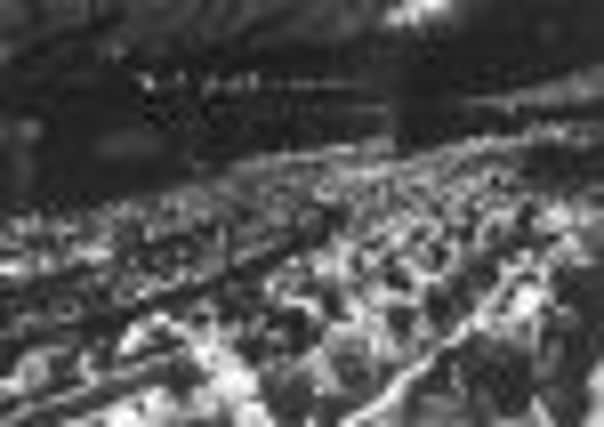Eurovision in Harrogate lacked a certain je ne sais quoi


History has a habit of repeating itself. Wind back to 1982 and Germany was in the ascendency, while Greece was out in the cold, going it alone and refusing to join in with its European neighbours.
There was one difference. Thirty years ago, it wasn’t the state of the Euro and strict austerity measures which were causing division. No, it was that year’s Eurovision Song Contest which had prompted toys to be thrown out prams.
Advertisement
Hide AdAdvertisement
Hide AdGreece refused to be part of that year’s shindig in Harrogate and they soon found a friend in France. A few months before the contest got underway, the France’s national broadcaster pulled their entry. By way of explanation a spokesman said: “The absence of talent and mediocrity of the song was where the annoyance set in. Eurovision is a monument to insanity.”
Some might have had cause to wonder, why France had only just noticed, but in the rush to finalise preparations for that year’s event no-one bothered to ask.
The arrival of the contest and Eurovision’s now legendary camp fanbase in Harrogate was something of a shock to the North Yorkshire town, more used to staging flower shows and classical concerts and for aficionados, of which there are legion, it wasn’t a vintage year.
“Perhaps it was because this was the seventh time Britain had hosted the contest in 22 years and maybe the novelty had worn off. Perhaps it was because money was scarce in 1982. Perhaps the footage just hasn’t aged well, but there wasn’t a lot to get excited about,” says Jamie McLouglin, who writes a blog dedicated to Eurovision, called ingeniously Boom Bang A Blog.
Advertisement
Hide AdAdvertisement
Hide Ad“It was held in the conference centre, which had only just opened and in comparison to other Eurovision venues it was tiny. It might have been ideal for holding a symposium on cork flooring, but not for an event like the Eurovision, which needs to loom large on the screen.
“In Harrogate the stage was half Top of the Pops, half Pebble Mill at One.”
While the backdrop and the BBC’s budget might have lacked the usual Eurovision glitz – the programme opened with a map of Europe and the question, “Where is Harrogate?” translated into various languages – presenter Jan Leeming did her best to add a little sparkle.
Freed from the newsroom and wearing a glittering blue ballgown and matching headband, Leeming took charge of the proceedings and hopes for the UK’s entry were high. One Step Further was performed by Sally Ann Triplett and Stephen Fischer under the name Bardo, and Ladbrokes had the duo as early favourites. The odds sadly meant nothing and following a rather curious performance Bardo bowed out in seventh place leaving Germany to romp home with 161 points, 61 ahead of nearest rivals Israel.
Advertisement
Hide AdAdvertisement
Hide AdThe winning song, a stirring ballad in typical Eurovision tradition was sung by 18-year-old Nicole Hohloch. Despite just receiving a derogatory one point from the Austrian judges, the Harrogate audience were moved to give it a standing ovation and organisers no doubt breathed a sigh of relief that the UK had been spared the job of hosting the notoriously costly event the following year.
“The UK’s entry wound up as John Peel’s favourite ever Eurovision song,” says McLoughlin. “It’s understandable as it sounded brilliant as a single and is right up there with the other contemporary stuff which fills the charts.
“Expectations were high that Sally and Stephen would reach at least fifth place or higher for the Royaume Uni. If they’d used a backing track instead of an orchestra those expectations might have borne fruit.
“Unfortunately once Ronnie Hazlehurst and the orchestra got their mitts on it, One Step Further sounded dreadful. It’s exactly the sort of song that’s not written for the woodwind section.
Advertisement
Hide AdAdvertisement
Hide Ad“Coupled with some very odd choreography – at one point the pair made some very suggestive thrusts towards the floor – and backing dancers all moving to completely different beats to each other it came across as an absolute dog’s dinner.”
Bardo might not have reached the heady heights of Bucks Fizz, but the performance didn’t dent the pair’s career prospects too much. Fischer continues to perform with the oddly named Penguin Cafe Orchestra and Triplett, best known then as presenter of Crackerjack! became a successful theatre actress, starring in Guys and Dolls and Anything Goes with John Barrowman. While many have doubted it, Bardo are at least proof there is life after Eurovision.